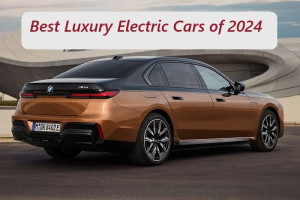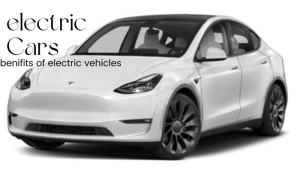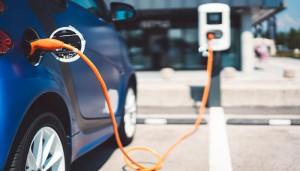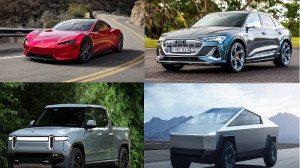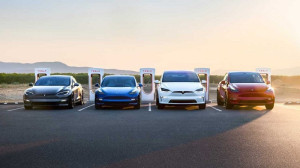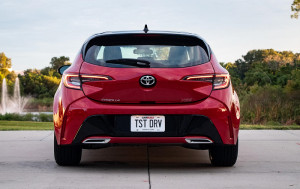Benefits of Electric Cars: Why They're the Future of Driving
Dive into the future of driving with our insightful article on the benefits of electric cars

Are you a passionate driver trying to decide on an environmentally friendly option for your car? If so, electric vehicles are the best choice. The past several years have seen an increase in the importance of making transit cleaner and greener. As people become more conscious of environmental issues and the need for sustainable development, electric cars are becoming more and more popular as a fuel-efficient alternative to gasoline-powered vehicles. Rechargeable batteries provide the electricity that powers electric vehicles, which makes them efficient and green—encouraging a lot of individuals to research the various advantages of owning an electric vehicle. We will go over the many benefits of electric vehicles to assist you with this topic. So, hold tight in your seatbelt and let's get started.
Ecological Advantages
Because electric automobiles produce substantially fewer greenhouse gases than gasoline-powered vehicles, the world is left cleaner and healthier. The U.S. Department of Energy estimates that annual carbon dioxide emissions from electric cars are 4.6 metric tonnes, compared to 11.4 metric tonnes from gasoline-powered vehicles. This emission reduction is especially crucial in the fight against air pollution and global warming.
Financial Advantages
Customers can profit monetarily from electric cars. Because they have fewer moving parts than gasoline-powered vehicles, they require less maintenance. They will cost less to repair throughout their lifetime. They are also less susceptible to price swings because they depend less on the price of oil. Due to the fact that electricity is far less expensive to run than gasoline, electric automobiles are also less costly to own than gasoline-pow
Advantages in Energy Efficiency
Electric vehicles use a lot less energy than their gasoline-powered counterparts. In contrast to gasoline-powered cars, which only convert about 20% to 30% of the energy contained in gasoline, they harness 60% of the electrical energy from the grid to provide power to the wheels. Electric car expenses and energy usage are reduced as a result of this efficiency.
Thrill of the Ride:
EVs have quick torque, which makes them fast. They can, therefore, accelerate far more quickly than typical autos. Driving an EV is like taking a tranquil trip because they are so silent. As you ride around, bid farewell to loud engine noises and relish the peaceful sounds of the city—or the absence of noise.
Advancements in Battery Technology
The efficiency and range of electric vehicles will continue to be enhanced by advancements in battery technology. Electric cars will continue to get cheaper and more accessible as their batteries grow more affordable and efficient to create.
Increased Investment in Charging Infrastructure
Governments and private businesses are making big in the infrastructure needed to charge electric cars, making the process simpler and more convenient for owners of these vehicles. Customers will be less concerned about range anxiety as there are more charging stations available.
Furthermore, more developments in technology and design will be fueled by creativity and competition as more businesses enter the electric vehicle industry. Future electric automobiles will be more reasonably priced and effectively powered as a result of this competition.
Major Players in the Electric Car Industry
Many businesses are making significant investments in electric vehicle technology; Tesla, Nissan, Chevrolet, and BMW are among the leading participants in this initiative. As a leader in the electric vehicle market, Tesla is praised for its innovative designs and cutting-edge technologies. The all-electric Model S, Model X, and Model 3 are in their lineup. Nissan, on the other hand, is the manufacturer of the Nissan Leaf. This electric vehicle has gained popularity all over the world and has been in production for over 500,000 units since 2010. The Bolt's cutting-edge features and design have won its praise. Another significant player is BMW, which produces electric vehicles like the i3 and i8 and plans to release more electric models in the future.
Rapidly Evolving:
Today's EV technology is constantly improving. The range of batteries is expanding, charging periods are growing shorter, and driving distance is getting longer between charges. EVs have a very bright future! Numerous countries are offering subsidies and incentives to help EVs become more accessible and inexpensive. Follow the trend—the electrified future of driving is here! Leading the way into the future of electric vehicles (EVs) is Tesla, the pioneer in this field. Imagine "flying" battery swaps for rapid charging, self-driving cars that function like futuristic robotaxis, and automobiles that can actually change colour like chameleons!
The goal of EV behemoth BYD in China is to lower the cost of and increase the accessibility of electric vehicles. They're investigating solar-powered automobile roofs, developing EVs at meagre costs, and installing charging stations in local communities. Volkswagen, a reputable brand, is leading the EV revolution with cars like the high-performance Porsche Taycan and the more inexpensive ID.3. Additionally, they are exploring cutting-edge solid-state batteries, which offer rapid charging and extended runtime.
Hyundai, known for its cute Kona EVs, has ambitious plans. They're gearing up to unveil stylish new EV SUVs and experimenting with hydrogen-powered cars that refuel in a way similar to charging your phone. Young startups are making waves, too. Rivian is developing rigid electric trucks built to conquer challenging terrains. Lucid Motors is crafting luxury EVs that can rival high-end gasoline cars.
Beyond the vehicles themselves, companies like Ford are expanding the infrastructure by setting up charging stations in rural areas. Others are contributing to sustainability by manufacturing EV batteries from recycled materials. It's not just about what's under the hood; the entire EV ecosystem is evolving.
Conclusion
Comparing electric versus gasoline-powered vehicles reveals substantial advantages in terms of the environment, economy, and energy efficiency. The cost and infrastructure of charging for electric automobiles remain significant obstacles. However, technological developments and legislative initiatives are assisting in resolving these problems. Electric vehicles have a lot of potential to be a substantial part of transportation in the future with further investment and innovation.

Are you a passionate driver trying to decide on an environmentally friendly option for your car? If so, electric vehicles are the best choice. The past several years have seen an increase in the importance of making transit cleaner and greener. As people become more conscious of environmental issues and the need for sustainable development, electric cars are becoming more and more popular as a fuel-efficient alternative to gasoline-powered vehicles. Rechargeable batteries provide the electricity that powers electric vehicles, which makes them efficient and green—encouraging a lot of individuals to research the various advantages of owning an electric vehicle. We will go over the many benefits of electric vehicles to assist you with this topic. So, hold tight in your seatbelt and let's get started.
Ecological Advantages
Because electric automobiles produce substantially fewer greenhouse gases than gasoline-powered vehicles, the world is left cleaner and healthier. The U.S. Department of Energy estimates that annual carbon dioxide emissions from electric cars are 4.6 metric tonnes, compared to 11.4 metric tonnes from gasoline-powered vehicles. This emission reduction is especially crucial in the fight against air pollution and global warming.
Financial Advantages
Customers can profit monetarily from electric cars. Because they have fewer moving parts than gasoline-powered vehicles, they require less maintenance. They will cost less to repair throughout their lifetime. They are also less susceptible to price swings because they depend less on the price of oil. Due to the fact that electricity is far less expensive to run than gasoline, electric automobiles are also less costly to own than gasoline-pow
Advantages in Energy Efficiency
Electric vehicles use a lot less energy than their gasoline-powered counterparts. In contrast to gasoline-powered cars, which only convert about 20% to 30% of the energy contained in gasoline, they harness 60% of the electrical energy from the grid to provide power to the wheels. Electric car expenses and energy usage are reduced as a result of this efficiency.
Thrill of the Ride:
EVs have quick torque, which makes them fast. They can, therefore, accelerate far more quickly than typical autos. Driving an EV is like taking a tranquil trip because they are so silent. As you ride around, bid farewell to loud engine noises and relish the peaceful sounds of the city—or the absence of noise.
Advancements in Battery Technology
The efficiency and range of electric vehicles will continue to be enhanced by advancements in battery technology. Electric cars will continue to get cheaper and more accessible as their batteries grow more affordable and efficient to create.
Increased Investment in Charging Infrastructure
Governments and private businesses are making big in the infrastructure needed to charge electric cars, making the process simpler and more convenient for owners of these vehicles. Customers will be less concerned about range anxiety as there are more charging stations available.
Furthermore, more developments in technology and design will be fueled by creativity and competition as more businesses enter the electric vehicle industry. Future electric automobiles will be more reasonably priced and effectively powered as a result of this competition.
Major Players in the Electric Car Industry
Many businesses are making significant investments in electric vehicle technology; Tesla, Nissan, Chevrolet, and BMW are among the leading participants in this initiative. As a leader in the electric vehicle market, Tesla is praised for its innovative designs and cutting-edge technologies. The all-electric Model S, Model X, and Model 3 are in their lineup. Nissan, on the other hand, is the manufacturer of the Nissan Leaf. This electric vehicle has gained popularity all over the world and has been in production for over 500,000 units since 2010. The Bolt's cutting-edge features and design have won its praise. Another significant player is BMW, which produces electric vehicles like the i3 and i8 and plans to release more electric models in the future.
Rapidly Evolving:
Today's EV technology is constantly improving. The range of batteries is expanding, charging periods are growing shorter, and driving distance is getting longer between charges. EVs have a very bright future! Numerous countries are offering subsidies and incentives to help EVs become more accessible and inexpensive. Follow the trend—the electrified future of driving is here! Leading the way into the future of electric vehicles (EVs) is Tesla, the pioneer in this field. Imagine "flying" battery swaps for rapid charging, self-driving cars that function like futuristic robotaxis, and automobiles that can actually change colour like chameleons!
The goal of EV behemoth BYD in China is to lower the cost of and increase the accessibility of electric vehicles. They're investigating solar-powered automobile roofs, developing EVs at meagre costs, and installing charging stations in local communities. Volkswagen, a reputable brand, is leading the EV revolution with cars like the high-performance Porsche Taycan and the more inexpensive ID.3. Additionally, they are exploring cutting-edge solid-state batteries, which offer rapid charging and extended runtime.
Hyundai, known for its cute Kona EVs, has ambitious plans. They're gearing up to unveil stylish new EV SUVs and experimenting with hydrogen-powered cars that refuel in a way similar to charging your phone. Young startups are making waves, too. Rivian is developing rigid electric trucks built to conquer challenging terrains. Lucid Motors is crafting luxury EVs that can rival high-end gasoline cars.
Beyond the vehicles themselves, companies like Ford are expanding the infrastructure by setting up charging stations in rural areas. Others are contributing to sustainability by manufacturing EV batteries from recycled materials. It's not just about what's under the hood; the entire EV ecosystem is evolving.
Conclusion
Comparing electric versus gasoline-powered vehicles reveals substantial advantages in terms of the environment, economy, and energy efficiency. The cost and infrastructure of charging for electric automobiles remain significant obstacles. However, technological developments and legislative initiatives are assisting in resolving these problems. Electric vehicles have a lot of potential to be a substantial part of transportation in the future with further investment and innovation.

